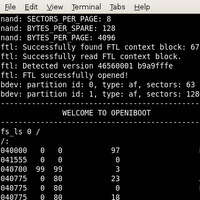Linux on the iPhone?


I enjoyed a recent post by PlanetBeing on the Linux on the iPhone blog. It was an attempt to justify why someone would want to spend a tremendous amount of time to bring Linux to the iPhone, when he or she could "just develop on an open platform instead with no such wasted effort?"
Good question, dude.
PlanetBeing says he doesn't want to buy other less-polished platforms just for a hack; he likes the iPhone. And the "knowledge that we are gaining/will have gained about the iPhone hardware will be of incredible practical value to the homebrew iPhone community."
However, when push comes to shove, it's really all about "choice," he says.
Perhaps my most important point is how iPhone Linux will affect the various open platforms in development. The iPhone has revolutionized the way the market thinks about mobile computing and now several mobile platforms are in development: OpenMoko, Google's Android, and Mobile Ubuntu (thought the last is not targeted for phones). All of these projects are based on Linux, and "based on Linux" means that, by definition, they "use the Linux kernel" and the Linux kernel is exactly what we're porting. As long as the kernel works, the rest of the operating system will barely need to be touched at all! (Fine print: provided that the working configuration of the kernel can support all the features the userland requires).
Imagine OpenMoko on the iPhone. Android on the iPhone. Ubuntu Mobile on the iPhone. Consumers will have choice, and not some Linux-hippie idealistic choice-for-the-sake-of-choice choice: All of these platforms have major momentum behind them and it is very possible they will end up being better than the iPhone's platform (have better UI, more application support, etc.).
Also, imagine what it will mean for the developers of these platforms: A ready userbase of millions of users. If many people can already install and try out one of these platforms, it'll be far easier to attract users to buy the hardware, and developers to develop for the platform. Thus, I do not believe we are harming the open platforms by developing on the iPhone. In fact, if all goes well, we will be allowing them to conquer the Apple iPhone.
Just imagine! Yikes!
Well, after playing around for a while with the only Android phone on the market, I can say that Google's current iteration of a "better UI" has a long way to go. The polish of Apple's UI is evident in seconds.
Last week, they were able to read the NAND file system. A first step...